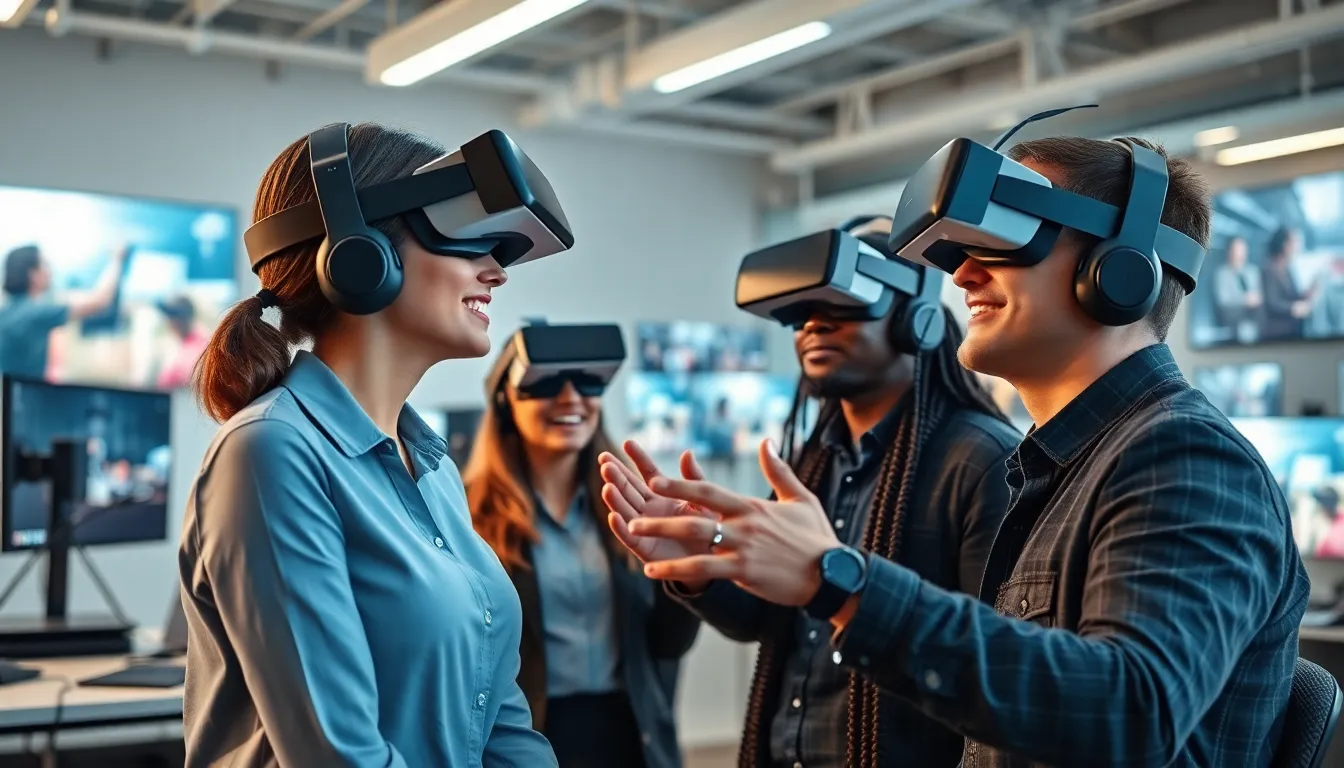Table of Contents
ToggleIn a world where technology evolves faster than a cat video goes viral, Meta’s latest shifts are turning heads and raising eyebrows. Forget about the days of merely scrolling through your feed; we’re stepping into a realm where virtual reality and augmented experiences redefine how we connect. Imagine hosting a meeting in a digital conference room while wearing your favorite pajamas—now that’s a game changer!
As Meta dives deeper into this tech revolution, it’s not just about flashy gadgets. It’s about reshaping the very fabric of our online interactions. Whether you’re a tech enthusiast or just someone who likes to keep up with the latest trends, understanding these shifts is crucial. Buckle up as we explore how Meta is not just keeping pace but leading the charge into a future that’s as exciting as it is unpredictable.
Overview of Meta Technology Shifts
Meta’s technological advancements represent significant changes in online interaction. Virtual reality and augmented experiences lay the foundation for these shifts. Platforms formerly focused on traditional social media now prioritize immersive digital environments. Users engage through virtual meetings that foster deeper connections.
New tools facilitate collaboration and creativity, enhancing user experiences. Meta’s investments in AI drive personalized content delivery. Such innovations change the dynamics of social interaction, creating engaging digital spaces. Notably, the introduction of the Metaverse illustrates this transformative journey.
Users can navigate shared virtual environments and participate in various activities. Enhanced features promote social presence, diminishing the barriers of physical distance. Meta’s My Reality app, for example, enables users to create tailored virtual experiences. Tools like Horizon Workrooms support remote team collaboration effectively.
Continued improvements in hardware, such as the Meta Quest headset, elevate engagement levels. Both accessibility and user interface enhancements ensure a seamless experience. Individuals seeking innovative social experiences turn to Meta’s evolving platforms.
This technological evolution emphasizes the integration of the physical and digital worlds. As Meta explores these frontiers, it constantly reassesses user needs and necessities. The focus remains on creating a balanced user experience that combines connection with creativity. Observing these shifts, users can anticipate how digital interactions will transform further.
Key Innovations Driving Change
Recent innovations at Meta emphasize the integration of advanced technologies that redefine user interactions. Prominent advancements include artificial intelligence and augmented or virtual reality, each contributing uniquely to the evolving digital landscape.
Artificial Intelligence
Artificial intelligence plays a pivotal role in enhancing user experiences. AI algorithms personalize content, adapting to user preferences and behavior patterns. Advanced analytics facilitate targeted marketing strategies, improving engagement rates significantly. Tools like ChatGPT streamline customer service by providing instant responses, ensuring users receive timely assistance. With AI, Meta enhances the overall efficiency of its platforms, creating a more responsive and intuitive environment.
Augmented and Virtual Reality
Augmented and virtual reality technologies revolutionize how users connect and collaborate. With virtual environments, users engage in immersive experiences that extend beyond traditional social media interactions. Platforms such as Horizon Workrooms allow real-time collaboration in lifelike settings, bridging the gap between remote teams. Additionally, the Meta Quest headset elevates virtual experiences, providing a seamless entry into the Metaverse. These realities encourage creativity and foster connections, significantly altering the way users interact online.
Impact on Businesses and Consumers
Meta’s technological advances reshape user experiences and open new avenues for businesses. These shifts foster unique interactions that enhance how individuals connect and collaborate.
Transforming User Experience
Enhanced user experience remains a cornerstone of Meta’s innovation. Immersive virtual environments enable richer communication among users. Personalized content using AI tailors interactions to individual preferences, making engagement more relevant. In addition, features such as Horizon Workrooms allow real-time collaboration across diverse locations. Transitioning to the Metaverse creates opportunities for users to engage in shared activities that extend beyond traditional social media interactions. This evolution makes interactions more dynamic, inviting deeper connections.
New Market Opportunities
Businesses gain significant advantages from Meta’s evolving digital landscape. With augmented reality and virtual experiences, companies can innovate marketing strategies and product showcases. The rise of immersive environments fosters an engaging shopping experience, allowing customers to visualize products in situ. Furthermore, remote collaboration tools enhance teamwork efficiency, presenting companies with new workflows. Additionally, entrepreneurs can explore unique revenue streams in the Metaverse through virtual goods or services. By adapting to these market changes, businesses can cater to consumer demands with enhanced solutions and offerings.
Challenges and Considerations
Meta’s technological shifts come with various challenges that users and businesses must navigate. Two significant areas of concern include privacy and security, alongside ethical implications.
Privacy and Security Concerns
Privacy issues arise as users immerse themselves in Meta’s virtual environments. Data collection becomes extensive, as platforms gather information to provide personalized experiences. Concerns center around protection against unauthorized access and potential misuse of sensitive data. End users must remain aware of what personal information they share within these digital spaces. Security measures must evolve continually, reinforcing trust between users and Meta’s platforms. Protecting user data through robust encryption and compliance with regulations is crucial for maintaining user confidence.
Ethical Implications
Ethical implications of Meta’s advancements warrant careful consideration. The immersive nature of virtual environments raises questions about addiction and the potential for distorted perceptions of reality. Users may find their perspectives shaped by algorithms steering their experiences. Maintaining transparency about how content is curated becomes essential. Additionally, fostering inclusivity ensures that diverse voices are represented, preventing a digital divide. As Meta shapes online interactions, the ethical responsibility to create a safe and equitable environment for all remains paramount.
Future Outlook for Meta Technology Shifts
Anticipation surrounds Meta’s ongoing technological advancements, particularly concerning user engagement in virtual and augmented environments. Virtual reality applications are expected to expand, enhancing online interactions well beyond traditional social media platforms. Collaboration tools promise to deepen user connections by facilitating real-time teamwork in shared settings, allowing users to actively participate in immersive experiences.
Emerging AI technologies also stand to redefine how content is delivered. Personalized recommendations will likely become even more intuitive, tailoring experiences to individual preferences and promoting meaningful connections among users. The introduction of tools like the My Reality app and enhancements to Horizon Workrooms displays Meta’s commitment to providing versatile spaces for online collaboration.
Businesses are positioned to benefit significantly from these shifts. Enhanced virtual environments will improve customer engagement, allowing for innovative marketing strategies and unique product showcases. Companies can explore new revenue streams within the Metaverse by offering virtual goods and services that entice consumers.
Security and privacy considerations remain crucial as these advancements unfold. Users must monitor what information they share within these platforms, while Meta has an ongoing responsibility to bolster data protection methods. Transparency in content curation will contribute to building trust, which is essential for maintaining a healthy online community.
Inclusion will play a critical role as well. Addressing ethical implications and preventing a digital divide requires Meta to prioritize equitable access to its innovations, ensuring all users can participate in this evolving landscape. As developments continue, users can expect significant shifts in how they interact with digital environments and one another, reshaping the future of online communication.
Conclusion
Meta’s technological shifts are paving the way for a new era of digital interaction. As users adapt to immersive environments and AI-driven experiences, the landscape of online communication is set to transform dramatically.
With the Metaverse at the forefront, deeper connections and innovative collaboration tools are becoming the norm. However, the importance of privacy and ethical considerations cannot be overlooked.
As Meta continues to refine its offerings, users can expect an evolving digital experience that enhances connectivity while addressing potential challenges. The future of online interaction is bright and full of possibilities, and staying informed will be key to navigating these changes.






